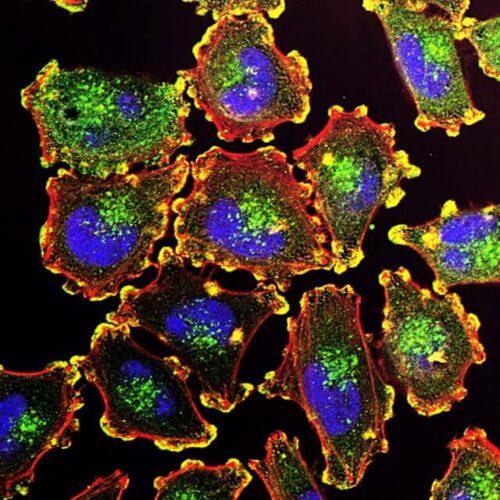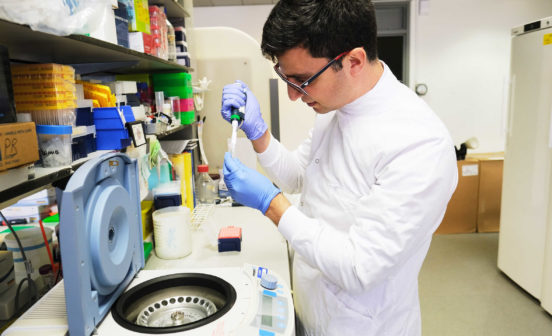Treatment Immune system can destroy ‘zombie’ cancer cells when SMARCA4 protein is inhibited

Scientists have developed a potential new approach for treating ovarian cancer by inhibiting a protein called SMARCA4.
Chemotherapy is a common treatment for cancer. Since cancer is caused when cells start dividing rapidly and uncontrollably, most of these drugs target fast-growing cells. To avoid being killed by the treatment, cancer cells can become ‘senescent’ or ‘zombie-like’. Zombie cells no longer divide and so are not affected by chemotherapy drugs. While this does stop further tumour growth, it’s not a long-term solution, as the accumulation of zombie cells can damage healthy tissue and make the tumour reappear.
New work published last week by researchers from the MRC Laboratory of Medical Sciences (LMS) and Imperial College London in Science Advances has proposed a new solution to this problem. By degrading a protein involved in regulating gene activity, called SMARCA4, it’s possible to engage the immune system to eliminate zombie cells caused by chemotherapy, increasing the effectiveness of anti-cancer drugs. This research is particularly exciting as while there is plenty of work on drugs that kill zombie cells, called senolytics, this new approach enhances the immune system’s natural ability to kill zombie cells.
“Senescent, or zombie, cells are naturally eliminated by the immune system,” says senior author Professor Jesús Gil, head of the senescence group at the LMS, “therefore, strategies that improve their immune-mediated clearance might be a way to decrease the aberrant accumulation of these cells and achieve benefits not just in cancer but in many senescence-associated diseases.”
Natural killer (NK) cells are the immune cells that destroy zombie cells, but they are often inefficient. The team aimed to find a way to improve NK-mediated elimination of zombie cells. They wanted to identify proteins that when inhibited or removed, would help NK cells more easily identify zombie cells. To do this they inhibited the activity of 7,000 genes and tested to firstly see which genes resulted in increased production of chemoattractant proteins (proteins that guide cells towards them by chemical concentration gradients) and then which of those enhanced NK-mediated elimination of zombie cells. From these screens, a gene encoding a protein called SMARCA4 was identified. When SMARCA4 is removed, the zombie cells release chemicals flagging themselves as senescent. This allowed for easier elimination by the NK cells.
To understand how the expression of SMARCA4 affects the progression of cancer in people, the team looked at ovarian cancer. Using data from a group of patients who took part in an international ovarian cancer research project called OCTIPS, the team found a small correlation between decreasing levels of SMARCA4 and NK cells found within the tumour. Interestingly, high levels of SMARCA4 were correlated with good clinical outcomes, which is the opposite of what would be expected from the results of the inhibition studies. This suggests a complex relationship between SMARCA4 and cancer progression.
To clarify these results the researchers tested the removal of the SMARCA4 protein in mouse models. To do this, they used a drug called AU-15330 which can cause the degradation of SMARCA4. AU-15330 increased the effectiveness of chemotherapies on mice implanted with ovarian cancer. Excitingly, the drug did not have any additional side effects on the mice.
“This study highlights the potential of harnessing the immune system and eliminating senescent cells,” concludes Jesús, “We now hope to extend our collaboration with the McNeish lab at Imperial College London and the Rodier lab at Université de Montréal to explore the potential of this approach to treat ovarian cancer.”
This work is the result of a far-reaching collaboration between the chromatin and development, metabolism and gene regulation, and senescence groups at the LMS, led by Michelle Percharde, Santiago Vernia and Jesus Gil respectively, Professor Hugh Brady from the Department of Life Sciences and Professor Iain McNeish from the Department of Surgery and Cancer at Imperial College London and Francis Rodier at the Université de Montréal.





